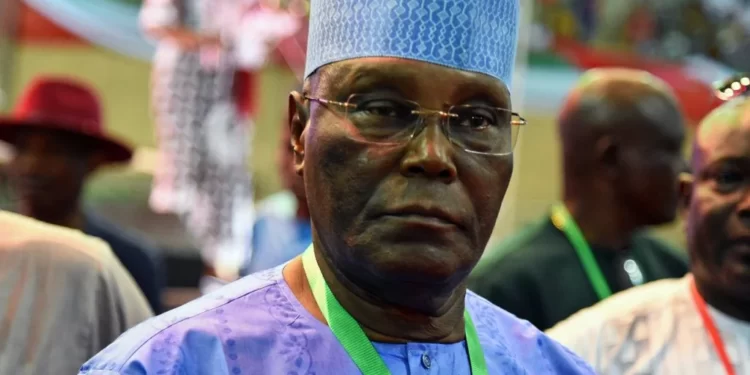The presidential candidate of the Peoples Democratic Party in the 2023 election, Atiku Abubakar, has stated that the 2025 budget proposal lacks the structural and fiscal discipline needed to address Nigeria’s multifaceted economic challenges.
The former vice president made this disclosure in a statement on Sunday, reacting to the 2025 budget proposal.
Recall that President Bola Ahmed Tinubu last week presented a N49.7 trillion 2025 budget to the National Assembly. The President had based the budget on key economic assumptions, including a N36.36 trillion revenue target, inflation reduction to 15.75 per cent, an exchange rate of N1,500 per dollar, oil production at 2.06 million barrels per day, a crude oil price of $70 per barrel, and a N13.39 trillion budget deficit.
Reacting to the budget, Atiku stated that it reflects a continuation of business-as-usual fiscal practices where budgets fail to impact the lives of citizens.
According to him, the 2025 budget’s ability to foster sustainable economic growth and tackle Nigeria’s deep-rooted challenges is questionable.
Atiku also criticised the budget’s reliance on N13 trillion in borrowing to fund the deficit.
“Weak Budgetary Foundations: The 2024 budget’s underperformance signals poor budget execution. By Q3 of the fiscal year, less than 35 per cent of the allocated capital expenditure for MDAs had been disbursed, despite claims of 85 per cent budget execution. This underperformance in capital spending, crucial for fostering economic transformation, raises concerns about the execution of the 2025 budget.
“Disproportionate Debt Servicing: Debt servicing, which accounts for N15.8 trillion (33 per cent of the total expenditure), is nearly equal to the planned capital expenditure (N16 trillion, or 34 per cent). Moreover, debt servicing surpasses spending on key priority sectors such as defence (N4.91 trillion), infrastructure (N4.06 trillion), education (N3.52 trillion), and health (N2.4 trillion). This imbalance will likely crowd out essential investments and perpetuate a cycle of increasing borrowing and debt accumulation, undermining fiscal stability.
“Unsustainable Government Expenditure: The government’s recurrent expenditure remains disproportionately high, with over N14 trillion (30 per cent of the budget) allocated to operating an oversized bureaucracy and supporting inefficient public enterprises. The lack of concrete steps to curb wastage and enhance the efficiency of public spending exacerbates fiscal challenges, leaving limited resources for development.
“Insufficient Capital Investment: After accounting for debt servicing and recurrent expenditure, the remaining allocation for capital spending—ranging from 25 per cent to 34 per cent of the total budget—is insufficient to address Nigeria’s infrastructure deficit and stimulate growth. This amounts to an average capital allocation of approximately N80,000 (US$45) per capita, which is insufficient to meet the demands of a nation grappling with slow growth and infrastructural underdevelopment.
“Regressive Taxation and Economic Strain: The administration’s decision to increase the VAT rate from 7.5 per cent to 10 per cent is a retrogressive measure that will exacerbate the cost-of-living crisis and impede economic growth. By imposing additional tax burdens on an already struggling populace while failing to address governance inefficiencies, the government risks stifling domestic consumption and further deepening economic hardship.
“The 2025 budget lacks the structural reforms and fiscal discipline required to address Nigeria’s multifaceted economic challenges. To enhance the budget’s credibility, the administration must prioritise the reduction of inefficiencies in government operations, tackle contract inflation, and focus on long-term fiscal sustainability rather than perpetuating unsustainable borrowing and recurrent spending patterns. A shift toward a more disciplined and growth-oriented fiscal policy is essential for the nation’s economic recovery,” he stated.






